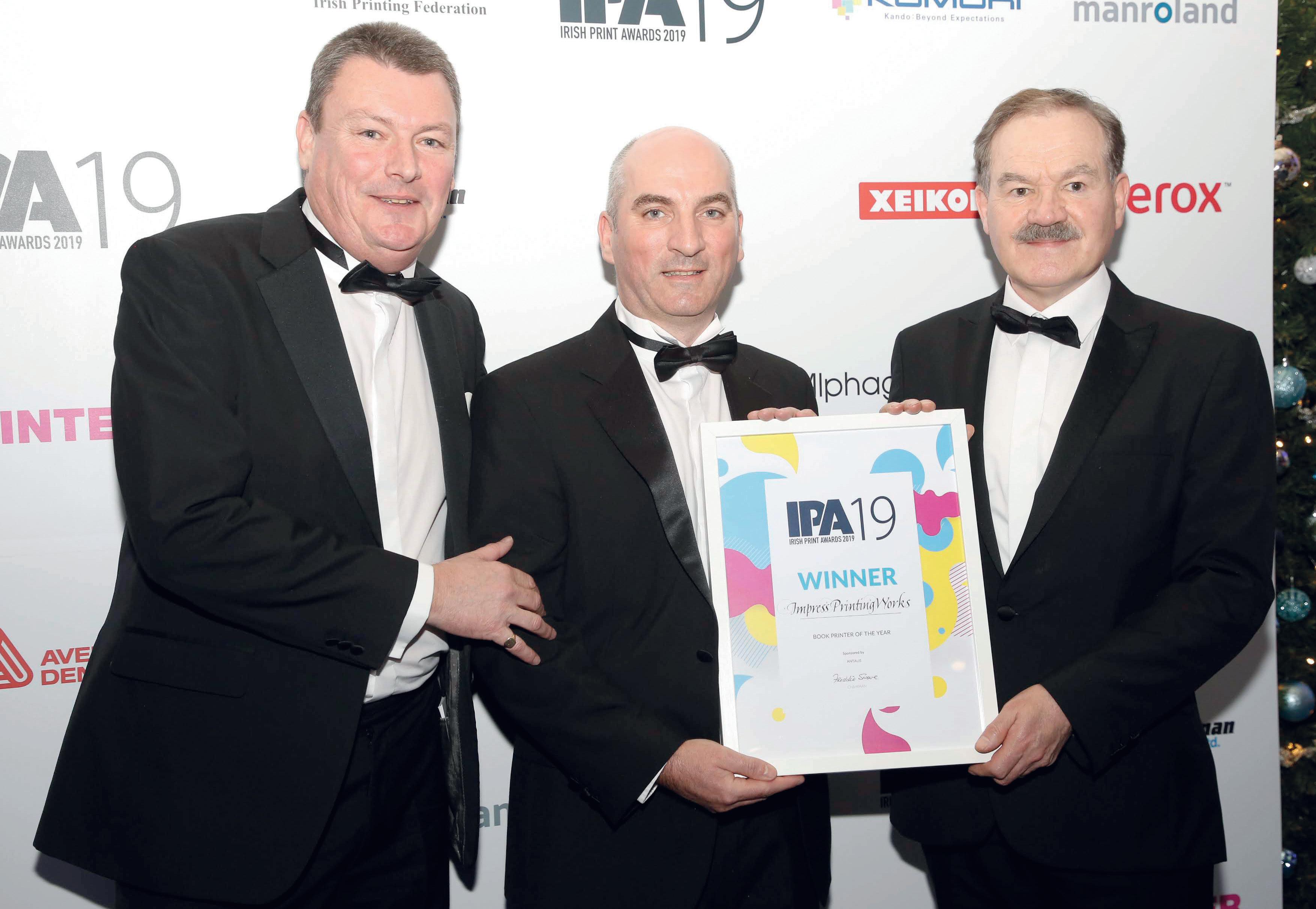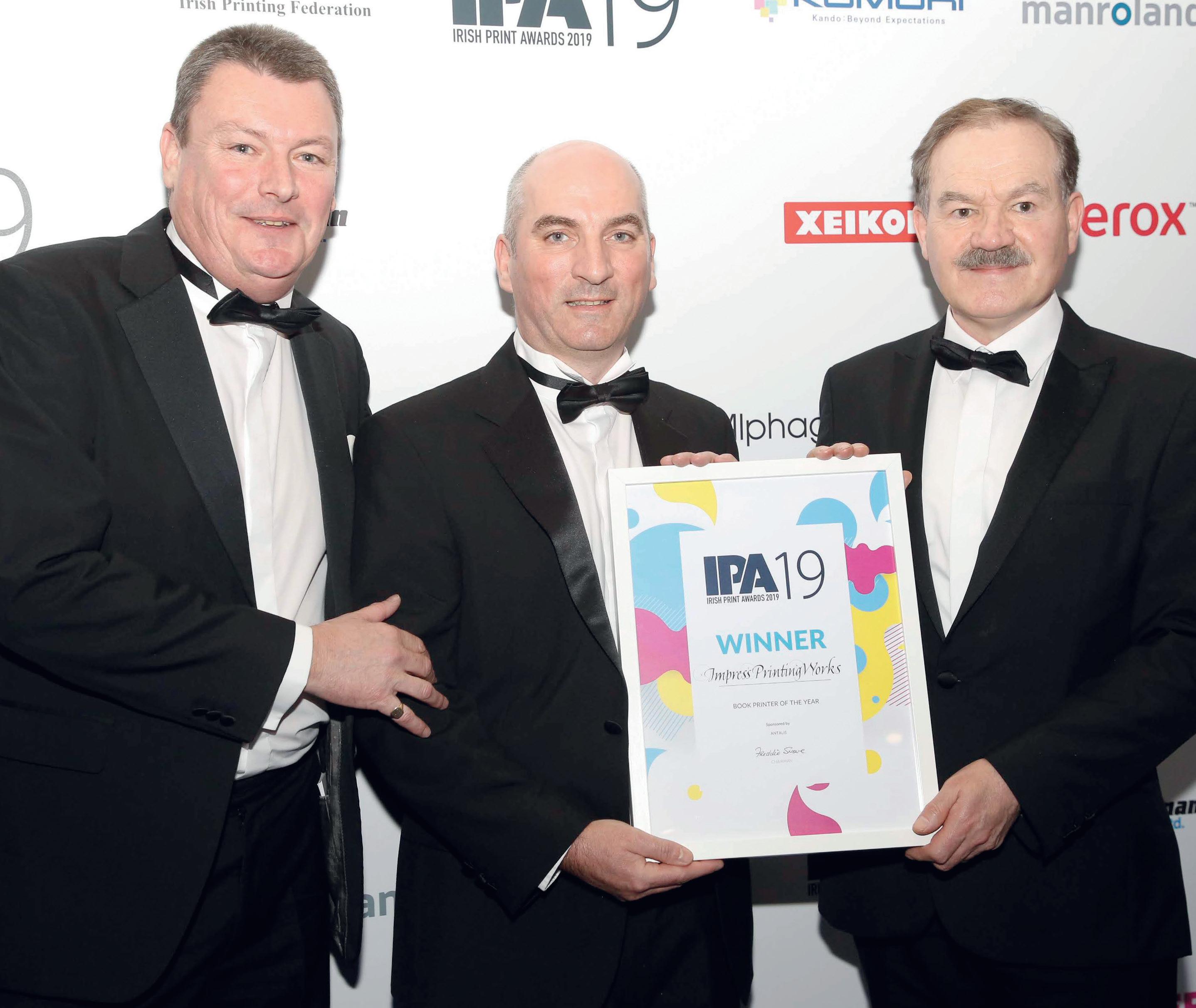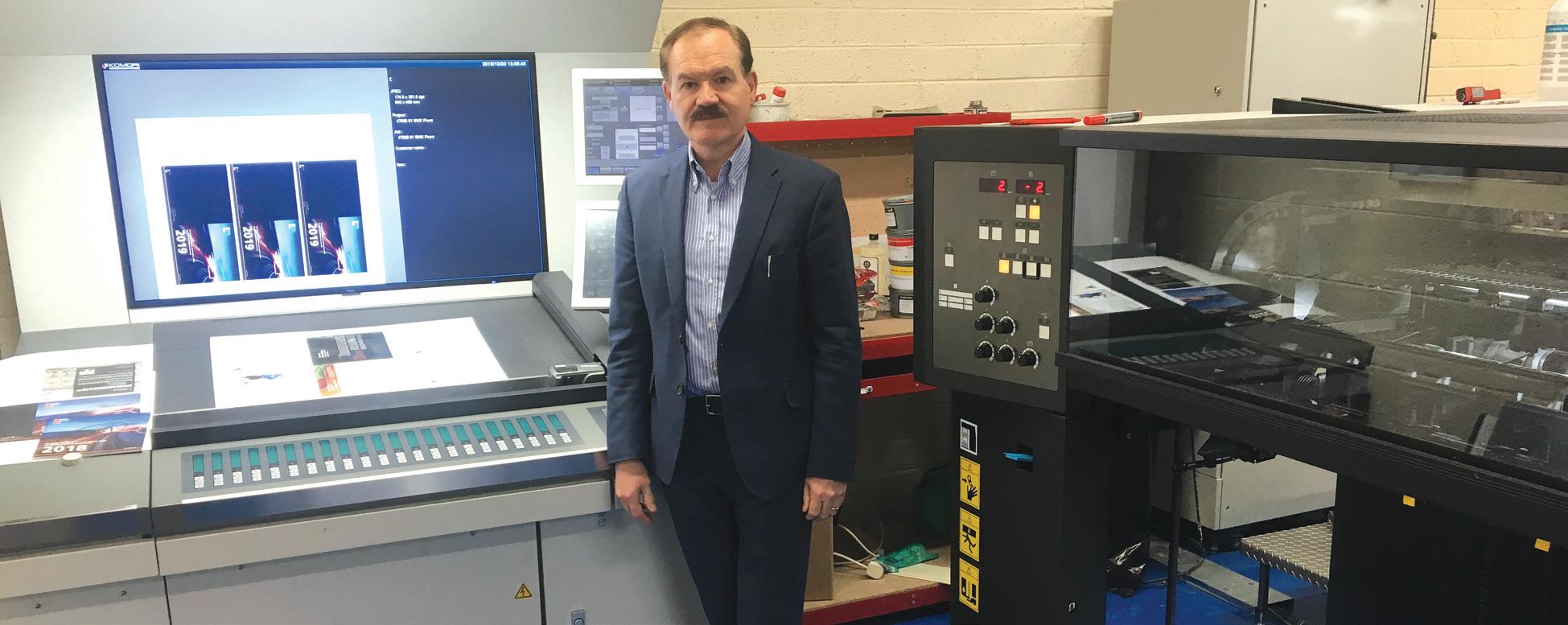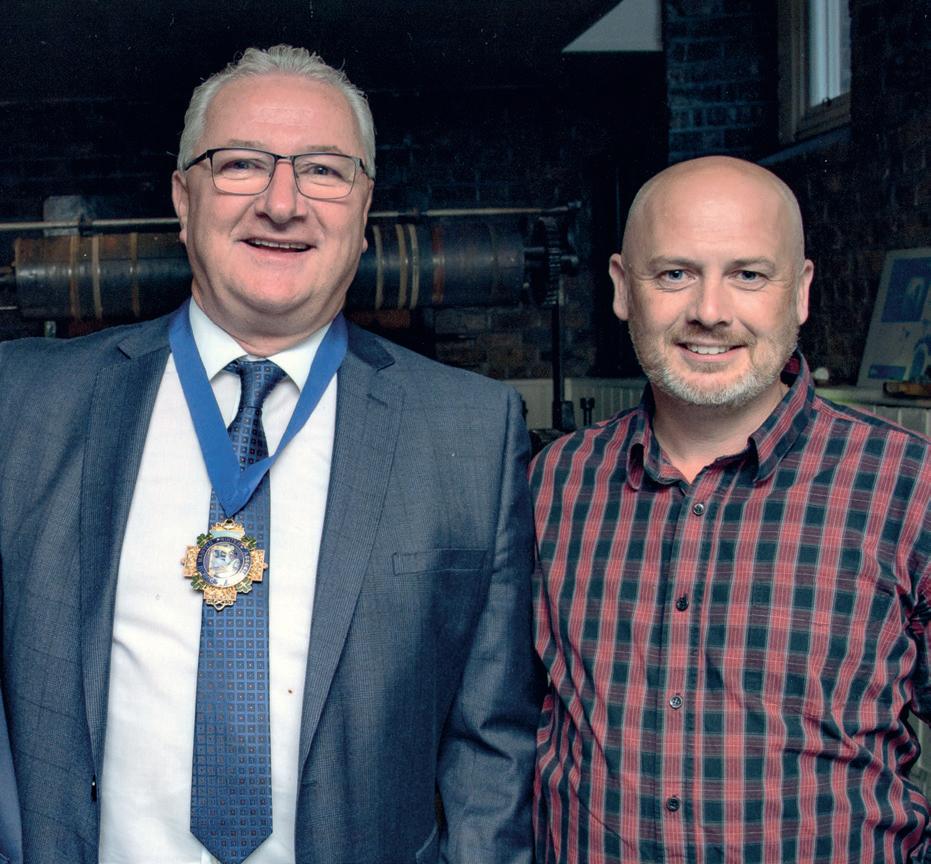
12 minute read
Satisfaction guaranteed at Frankfurt Trade Fairs
Guaranteed AT FRANKFURT TRADE FAIRS Satisfaction
Over 3,051 exhibitors from 74 countries attended this year’s Christmasworld, Paperworld and Creativeworld Consumer Goods Fairs
Exhibitors were on hand at each of the events to showcase their new products for decoration, festive décor, paper, office supplies and stationery, as well as hobby, crafts and artists’ requisites to the national and international trade. Around 84,000 visitors attended the three international trade fairs which was, according to Messe Frankfurt, a slight decline on the previous event, reflecting the ongoing consolidation tendencies on the retail side and an overlap with Chinese New Year. Themes across all three fairs focused on urbanisation, New Work and individualisation. According to a survey conducted by the Institute for Retail Research (IFH), customers nowadays are increasingly seeking information online and buying offline. They want competent consulting, emotional experiences and additional service. This is, says the research, only available in the retail sector. Christmasworld, Paperworld and Creativeworld show what futureoriented models can look like in the concept areas “Retail BLVD”, “Future Office” and “Future Learning”, along with “Urban Art Lab: Education”.
Exhibitors at the fairs commented on the good mood among retailers and the high level of internationality and visitor quality, positives that have made them optimistic for the new business year. Messe Frankfurt says that 76% of visitors to the three trade fairs were

from top management. The fact that the trade views Christmasworld, Paperworld and Creativeworld as its main contact and order platform was also confirmed by the visitor survey conducted by Messe Frankfurt. The satisfaction levels remain at a high level and are currently at 96%.
The desire for greater sustainability also played a major role across all three fairs. Natural materials, recycled products or a reference to resource-saving production was to be found across all exhibition halls. At the same time, end users want high-quality materials with a high-quality finish. In combination with dark shades of blue and green as well as enhancements with gold accents, this trend lends an elegant touch to products and displays. Messe Frankfurt says another growing trend is personal appreciation, expressed through gifts that have been designed individually. “Generally, the themes of giving and celebrating in connection with family sociability play a major role. Enjoying together, celebrating parties and sharing special moments are becoming increasingly important as a counterbalance to the digital world.”
The consumer goods fairs will take place once again in 2021: CHRISTMASWORLD: 29 January - 2 February 2021 PAPERWORLD AND CREATIVEWORLD: 30 January - 2 February 2021
A winning formula
At last year’s Irish Print Awards, Impress Printing Works took home The Book Printer Of The Year award along with The Overall Printer Of The Year accolade. We caught up with Fintan O’Callaghan at Impress to talk about the two wins and how the print fi rm is keeping abreast of industry changes


To what do you attribute your two wins at the 2019 Print Awards? Basically the quality of our workmanship. We work closely with designers who have put a lot of time into creating quality design and expect that same level of commitment in the print and finishing of their design work. We invest the time and the attention to detail into their creations that they deserve.
What kind of work do you specialise in? High end brochure and book work. We do most of the finishing in-house, from laminating and foiling to perfect binding. One of our strengths is the combined knowledge and experience of our sta along with our equipment, which allows us to confidently print and finish some of the most unique print jobs.
How important is customer service? Extremely important. Response times have to be immediate, honest and accurate. We survive only through good customer service and our customers know that their jobs are always in safe hands.
Do you have much repeat business? Yes. We don’t have reps so we rely on repeat business. We build strong Pat Cotter, Managing Director, Impress Printing Works

relationships with our customers and some of them have been with us since we opened our doors 30 years ago.
How have you diversified to adapt to a changing industry? We have invested heavily in the latest digital presses and associated finishing equipment, along with keeping our litho presses up to date with a recent purchase of a Komori 5 colour litho press.
Are there sectors you would like to get into? Over the last number of years, we’ve seen our pharmaceutical printing business grow. We would like to continue this growth by expanding our pharmaceutical range of services and we have invested in the latest equipment to allow us to do this.
How has the industry changed over the past few years? The press runs have shortened but the volume of individual jobs has increased and there has been a noticeable shift from litho to digital because of that. We expect the industry to further contract; the commercial side of printing is decreasing year on year.
Do you take on apprentices? What’s your opinion on the cancellation of the apprenticeship scheme? No, we haven’t taken on apprentices for a long time, since 2002 I believe. I think the cancellation of the scheme was inevitable, especially since the 2008 downturn. Having an apprentice is an expense that most small companies cannot a ord. The apprentices that came through Impress have left the industry altogether. We would be more inclined to train new sta in-house as we have very experienced and skilled senior members who are only too willing to pass on their skills.
Is the industry in danger of losing its core skills? Yes, we have had first-hand experience of seeing sta leave the print sector for more stable industries. With the onset of digital presses and ease of operation, less print skills are required.
How difficult is it to attract and retain staff? As a consequence of the contraction in the industry, the number of people entering the sector is shrinking. We are lucky in that many of our sta have been with us for over 20 years.
What are your ambitions for the company? To continue to stand out from the crowd for the next 30 years and beyond!
Denise Maguire caught up with Diarmuid Dawson and Dermot Downer to talk about the challenges facing the industry in the year ahead
in an industry coming under pressure from price increases, skills shortages and increasingly rising postal charges, it’s crucial to get the message out there that not only is print not wasteful, it’s also a practical and sustainable communications medium. Diarmuid Dawson, Irish Printing Federation (IPF) President and MD at Innovative Print Solutions Ltd and Dermot Downer, Vice President of the IPF and MD at Westside Press Ltd, say the message isn’t getting through. “The lion’s share of the materials produced by the print industry are recyclable, with the industry’s main raw materials coming from European managed forestry schemes grown and replenished at a rate of two to one for pulp production. Print as a form of communication has quite a low carbon footprint if it is produced locally for a local audience. A large number of Irish print suppliers are now working in conjunction with their suppliers and the World Land Trust to carbon balance the paper used in their plants,” said Diarmuid. It’s crucial that the industry steps up its efforts when it comes to promoting print’s green credentials, particularly as the younger audience are so very environmentally conscious. “No-one seems to be talking about the carbon footprint that’s associated with the IT industry and the back-up stations across Europe.”
Last year, I spoke with Dermot about work leaving the State to be printed elsewhere. It’s an ongoing concern for the IPF and a bugbear for the industry as a whole. “We understand that in some cases there may be justifiable reasons such as specialised machinery and technology which might be required for a certain project. In other cases, we’ve been told by clients that the low or non-existent VAT rates being charged abroad can be very attractive, particularly for not for profits, charities, colleges and other government/ publicly funded bodies as they can’t reclaim VAT. Our nearest neighbour’s VAT rate on most print items is zero compared with our 13.5% and 23% so you can see how this might seem attractive to an organisation that can’t reclaim or offset their VAT,” said Dermot. The Federation is trying to get support from the government on this, said Diarmuid, as it’s just not a level playing field. “Our industry is going down by about 10% a year and sometimes it feels like the government is simply waiting it out until we’re extinct. We need help from the government and we need it now.”
For the past five years, the Irish Printing Federation has been in talks with Solas and TU Dublin about how best to restore the apprenticeship scheme. “The Federation feels extremely let down by the government, by Solas and by TU Dublin. A few years back, we were asked to get a commitment from the industry, confirming how many apprentices they would commit to. We did this and after umpteen meetings with Solas and TU Dublin, we were told
SECOND TO NONE More speed, more quality, more profit

Océ VarioPrint 6000 TITAN digital monochrome production presses from Canon drive productivity and extends media flexibility
#UNLEASHPRINT

To find out more contact us at unleashprint@canon.ie, call us on 01 2052415 or visit canon.ie/unleashprint
they could handle 8-10 apprentices a year. A year later, we reported to them that we had 28 apprentices committed to the scheme and last year, we said we had 32 apprentices and about 24 companies committed. Right now, we have over 40 apprentices ready and waiting and about 30 firms but we’re still getting led down the garden path by Solas,” said Diarmuid. Despite the very serious skills shortage within the industry, no decision has been taken on the scheme. “It may be the case that TU Dublin doesn’t want to reinstate the apprenticeship scheme and if this is the case, we need to know so we can adjust our plans. The industry has a huge requirement for skilled staff and we have the apprentices ready to go but the appetite just isn’t there within Solas or TU Dublin so we’re saying to Solas, get someone else to do it and we’ll help,” said Dermot. A lack of accountability within Solas isn’t helping the situation, says Diarmuid. “There’s no-one within that organisation that’s willing to step up and take charge. The situation is completely untenable and it’s also a total embarrassment. The Irish Defence Forces have gotten so frustrated with the whole thing that they’ve decided to train their printing apprentices in Northern Ireland. We’ve met with the company that’s going to do that training but they can’t take on any more apprentice as they’re at their max of 80 apprentices!”
In 10 years, no new print apprentice has entered the industry, says Dermot. “That’s a big gap. I’ve had people approach me to say we need young people coming into the industry but we just feel completely powerless. If I hadn’t seen it for myself, I wouldn’t have believed what Diarmuid and the Federation have gone through over the past few years, trying to get the scheme up and running again. There are people involved in this that are not taking responsibility for a role they’re being paid to do. We’re doing this on a voluntary basis and trying to run our own business as well, but that just shows how important we feel the scheme is.”

The Design Print and Packaging Skillsnet (DPPS) is a valuable resource that’s training workers in various facets of the industry, but it’s not delivering apprentices. One solution that has been put forward to Solas is around offering additional, more technologically advanced elements of the scheme through DPPS. “The apprenticeship scheme as it was isn’t actually fit for purpose. It needs to be completely reimagined and one way to facilitate that quickly is to get DPPS involved. We also have members of the IPF who are more than willing to train people individually on their machines. The excuses that we’ve been given, that they don’t have the people or the equipment, are just not good enough anymore. We can deliver the equipment but all we’re getting is red tape,” said Diarmuid. Two people recently left Innovative Print Solutions Ltd because they couldn’t get an apprenticeship, while Dermot has had three people leave his firm. “The last guy who left now has an apprenticeship as an electrician. His father, his mother and his grandfather were all in the printing sector. The industry is screaming out for skilled workers and yet we have a significant number of people who actually want to take on a print apprenticeship,” said Diarmuid.
Diarmuid and Dermot have told Solas that there’s little point in meeting with them again. “This is the responsibility of Solas and the government but they’re just not taking it seriously. We don’t know who to trust or who to go to anymore and that’s why we’re trying to put this in front of politicians. We’ve been banging our heads against a brick wall on this for years. A bit of attention and respect is all we’re looking for,” said Dermot.
The IPF would like to encourage new members to join in its campaign as it’s only with numbers that the Federation can push for change. If you are involved in print production or a related industry, please contact the IPF by emailing info@irishprintingfederation.ie or calling 0862027588, www.irishprintingfederation.ie





